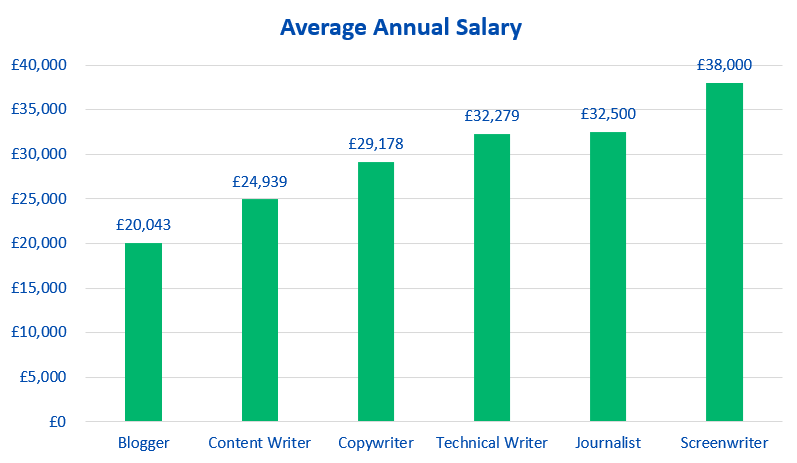Creative Writing
Career insights: Become a Writer
Writing explained
Updated June 2021
If you love crafting creative sentences or writing poignant poetry and thought-provoking prose, a career in writing might be your calling. If you are a writer-type, you are likely to suffer from overthinking everything, which can completely paralyse you when turning your passion into a professional venture. With 89,000 writers in the UK in 2020, It is a competitive industry in which you need to have a sense of direction to avoid getting lost[i].
We know it can be hard to find a path into the writing world, which is we created this guide – let us help you develop from a secret phone note novelist to a content writing prodigy.
What is a writer?
We are sure you know what a writer is, or you wouldn’t be here. But for the sake of dictionary level clarity…
‘A writer is someone who communicates thoughts, ideas, and concepts through the written word.’
What sets a ‘real’ writer apart from any Joe Bloggs with a laptop is that writers can adapt to different writing styles, they can clearly convey a message through their writing and often write in a range of tones to suit different audiences.
Types of writers
Even though most writers can churn out a range of writing styles, adaptability doesn’t mean that someone who specialises in copywriting could write a novel with ease (or vice versa). There is a difference between writing clickbait for Buzzfeed and articles for The Guardian, but both jobs require a lot of skill.
This is where different ‘types’ of writing and writer come in and open up a whole new realm of possibilities. Here are some types of writer:
- Copywriter - writes for websites, aims are to sell and convey brands message.
- Content writer – writes for websites, aims are to educate, entertain and instruct readers (a content writer wrote this guide, for example)
- Journalist – immerses themselves in research to uncover a story playing out in the world.
- Fiction author - create short stories and novels.
- Non-fiction writer – conducts research on a topic and presents it in an accessible, readable way.
- Essayist – writes essays on different topics which are published on websites and in magazines.
- Poet - crafts traditional, abstract, and modern poetry.
- Blogger – writes about any topic and publishes it on a blog.
- Playwright – creates plays for stage performances.
- Screenwriter – writes for film and television.
- Technical writer – writes manuals and textbooks.
Salary
According to Reed, the average salary for a writer in the UK is currently £37,122. A writers salary depends on infinite factors, like how many hours they work, their level of experience and where they live (e.g., London wages are notoriously much higher than wages in other areas).
To give you an idea of how much a writer’s wage can vary, these are the average salaries for different writing careers.

Data from: PayScale, Indeed and Total Jobs
If you are an author, it’s pretty unlikely you’ll get a steady annual salary. Writers in this field reported that they earnt most of their money through publishers, though there are lots of other places that they can make money[ii].
- 80% of earnings came from publishers (avg. £12,932)
- 11% of earnings come from lectures (avg. £1,759)
- 9% of earnings come from self-publication (avg. £1,450)
- 5% of earnings came from teaching creative writing (avg. £822)
- 4% of earnings come from ALCS (avg. £714)
- 3% of earnings come from grants/bursaries (avg. £501)
- 3% of earnings come from public lending (avg. £467)
- 1% of earnings come from awards and prizes (avg. £230)
Until you have a best-seller, writing novels or short stories for a living can be a financial risk, but there are plenty of writing-oriented jobs you can pick up on the side.
How to become a writer
1) Qualifications
There is no one set of qualifications that applies across all writing fields. That said, many professional, published writers do have a university degree in the arts or humanities. Having a formal education is not a requirement for blogging or creative writing, but it might help you out if you’re aiming for a career in journalism, copywriting or technical writing.
Employers in more competitive spheres will probably want to see a degree in a relevant subject on your CV, you could look at applying for an[iii] English Literature or Language, Journalism, or Creative Writing course at University.
If you want to make money whilst you get your qualification, try looking for an apprenticeship scheme in copywriting or content writing.
2) Gain Experience
Experience is vital when it comes to a career in writing. Having the right qualifications is great, but employers will look favourably on people who have had a chance to get their hands dirty.
We will admit that it isn’t too easy to get work experience as a writer, especially if you’re outside of major cities and can’t afford to take an unpaid internship. If you look hard enough, you will find something – try gaining experience by…
- Start a blog – whether you write about something you are passionate about or force yourself to write blogs on topics you aren’t familiar with, building a blog and gaining an audience will show any potential employers or clients that your content is king.
- Freelance – get on a freelance platform and start pitching for jobs. They will come in slowly at first, but once you’ve got a few clients in the bag it should get easier.
- Write, write, write – building up a portfolio is something most people don’t even consider doing for writing, but this can set you apart from other candidates when it comes to interviewing for a job.
- Local newspapers – if you have a local newspaper, reach out and see if they are looking for any help.
3) Network
There can be an element of it being about 'who you know, not what you know' when it comes to job-hunting in the writing industry. If you want to be a journalist, your best bet is going to University, where you can rub shoulders with people who have the contacts you need to add to your address book.
You can also succeed in doing this by having an excellent social media presence. Find an angle and get busy on Twitter & LinkedIn. You will not get noticed until you put yourself out there.
4) Build Skills
A writer needs more than just strong writing skills to succeed. Whether you are writing a product description for a website or an article for an established newspaper, there are some skills you can’t get away with not having. That being said, once you have gotten into the swing of writing you’ll develop your own strengths, techniques and skills.
These are the skills we recommend building on before trying to enter the writing world.
- Strong Communication Skills - If a reader cannot understand what you are trying to say, you have failed in your mission. Evoking emotions, sparking ideas, and entertaining a reader – these are all key components of great writing.
- Observational Skills - One of the things that sets a writer apart from the average person is that they have a knack for observation, and the ability to translate that observation into writing. Being able to observe and describe the world around you in ways people have not considered before is an enviable talent.
- Strong Reasoning - Writers need to be able to look at an issue and present it in a novel or unique way. You should be able to use your reasoning to evoke thoughts and sway opinions in both the fictional and non-fictional world.
- Expert Knowledge of Spelling, Grammar and Punctuation – A misplaced comma or misused word can change the meaning of a sentence entirely, which is why writers should be well versed in the rules of the English language. You might think a missed comma is no big deal, but if you’re writing legal documents, the misuse of a comma could land you in a world of trouble.
- Time Management – Whether you are a freelancer or a full-time writer, you need to be able to manage time impeccably. Knowing how long it should take you to tap out a 1000 word article will make planning your workflow easier.
Summary
If you are ready to get your writing career kick-started, get going today instead of tomorrow. It will be a struggle (and if it isn’t, you aren’t doing it right) but all your hard work will pay off.
Sources[i] https://www.statista.com/statistics/319271/number-of-authors-writers-and-translators-in-the-uk/
[ii] https://pickupyourpen.com/statistics/
[iii] https://nationalcareers.service.gov.uk/job-profiles/writer

